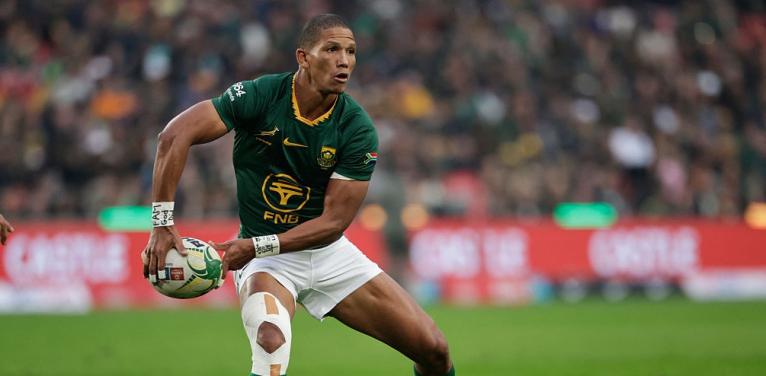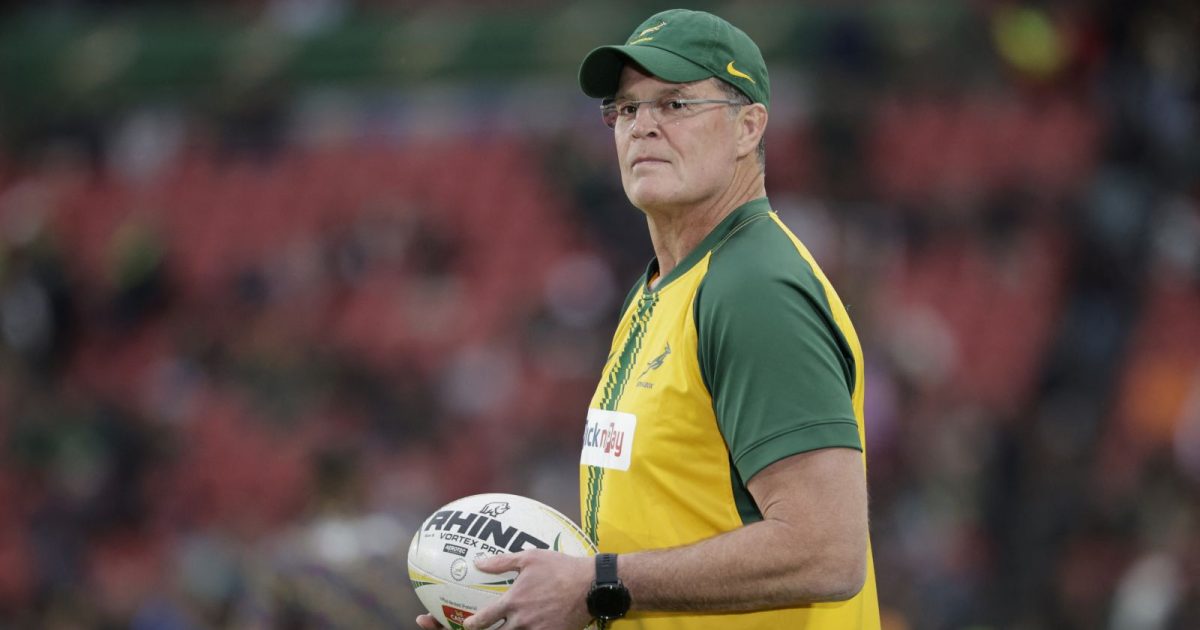What a difference 77 minutes can make. On Saturday, at 5:38 pm in Johannesburg, the world was spinning as planned. Siya Kolisi had just run through the guts of the Wallabies’ defence, sliding over for the Springboks’ third try to open up a 22-0 lead against Australia. Every pre-game prediction looked secure. Conventional wisdom was made manifest.
Then the final whistle sounded at 5:55 pm and everything had changed. The Springboks looked knackered. World champions were suddenly ordinary. Rassie Erasmus, the man who always has a plan, seemed clueless. South Africa were no longer the world’s number one-ranked team. Indestructible players were breaking at the seams. Was this the end of the dynasty?
This is, of course, hyperbole. But that seems to be the default these days. Maybe sports analysis has always dealt in reactionary hot-takes; we just have social media and the immediacy of the internet amplifying the loudest voices on the fringe.
 Rassie Erasmus had plenty of time to digest the Ellis Park defeat
Rassie Erasmus had plenty of time to digest the Ellis Park defeat
The Springboks are determined to find that perfect balance in their game when they face the Wallabies in Cape Town on Saturday.
 Rassie Erasmus had plenty of time to digest the Ellis Park defeat
Rassie Erasmus had plenty of time to digest the Ellis Park defeat
The Springboks are determined to find that perfect balance in their game when they face the Wallabies in Cape Town on Saturday.
If the South African coaches have mimicked the panic expressed elsewhere, they have at least recognised that nothing but a win against Australia in Cape Town will suffice. Erasmus has previously reverted to pragmatism in the pursuit of short-term success. He did so in the 2021 British & Irish Lions tour and again in the latter stages of the World Cup in 2023.
The team selected is instantly recognisable. Some faces may have changed since the World Cup final, but the vibe is classic Erasmus.
His opposite number, Joe Schmidt, will know what to expect. But world-class coaches and their world-class teams have had the Springboks’ playbook telegraphed to them before and been unable to stop it. This game could answer a few questions: Can the old Springbok guard still hack it? Can the Wallabies forwards front up? Are the two sides heading in opposite directions?
 South Africa’s fly-half Manie Libbok passes the ball during the Rugby Championship first round Test match between South Africa and Australia at the Ellis Park Stadium in Johannesburg on August 16, 2025. (Photo by WIKUS DE WET / AFP) (Photo by WIKUS DE WET/AFP via Getty Images)
South Africa’s fly-half Manie Libbok passes the ball during the Rugby Championship first round Test match between South Africa and Australia at the Ellis Park Stadium in Johannesburg on August 16, 2025. (Photo by WIKUS DE WET / AFP) (Photo by WIKUS DE WET/AFP via Getty Images)
Manie Libbok is gone and Handre Pollard is in. A similar switch occurred during the 2023 World Cup semi-final. The reasons are obvious and those who revel in criticising Libbok’s every touch will rejoice. The Springboks will not be expansive. That’s not to say that Pollard will avoid cross-kicks and spiralling skip passes at all costs, nor that he is incapable of doing so. It’s just that this will not be the default.
They’ll be more direct and won’t overplay as much. The retention of Grant Williams at scrum-half means there is still the potential for lightning snipes from broken play, but the intention is evidently to be more composed with ball in hand. This is amplified by the selection of Willie le Roux at fullback. The general in the outfield might not have the strength or dazzle of Aphelele Fassi and Damian Willemse, but his ability to read a game is still second to none. If he can spend more time directing traffic than back-peddling on defence, the likelihood of a Springboks victory will increase.
Erasmus has also bulked up the pack. He’s gone back to a 6-2 split on the bench with five tight forwards coming off the woodwork, including Eben Etzebeth and Lood de Jager. Last week, the vaunted bomb squad failed to ignite. This time it’s packing as much heat as possible.
Franco Mostert should also add some heft. The last time he started in the back row was in August 2023 against Argentina in Buenos Aires. That was 26 Tests ago. Of course, this is a response to the absence of the injured Pieter-Steph du Toit, but the temptation to play a more natural flanker was ignored for a reason. Mostert’s versatility is an asset, but his size and ability in close contact are what likely swayed the decision.

Head-to-Head

Last 5 Meetings
Average Points scored
All the pressure is with the South Africans, but maybe that’s precisely what they need. They have so often looked their most dangerous when cornered. The “backs-to-the-wall” mentality is almost part of the team’s DNA, woven into the fabric of their identity. We know from the documentaries that the energy inside the dressing room will mimic that of an army under siege. You can just imagine Erasmus pointing at Canan Moodie and telling him, “Don’t forget about the kids in Paarl. Do it for them.”
The sweeping changes make rugby sense. A shake-up was needed and clearly a shift in strategy required. But they also make sense on a psychological level. Erasmus is betting on certainty. He wants his team to look around and feel something familiar. He wants the crowd in Cape Town to look down from the stands and instantly recognise that this is a Boks team.
Because the stakes are enormous, and not just because the Rugby Championship is on the line; lose this weekend and the title is all but lost. Should the result go against them, then there is the risk that Erasmus will be compelled to tear up the playbook and start over.
If the Wallabies once again boss the breakdown, bully the Boks at the point of contact, pilfer their line-outs and dilute the bomb squad, then there is a sense that something more profound is shifting. South Africa’s aura of inevitability, that iron-clad belief that they will always find a way, would suddenly look fragile. A second defeat in as many weeks would not just be a tactical failure; it would invite existential questions.
Cape Town won’t just host a Test match. It’s hosting an 80-minute referendum on the Springboks’ identity.
